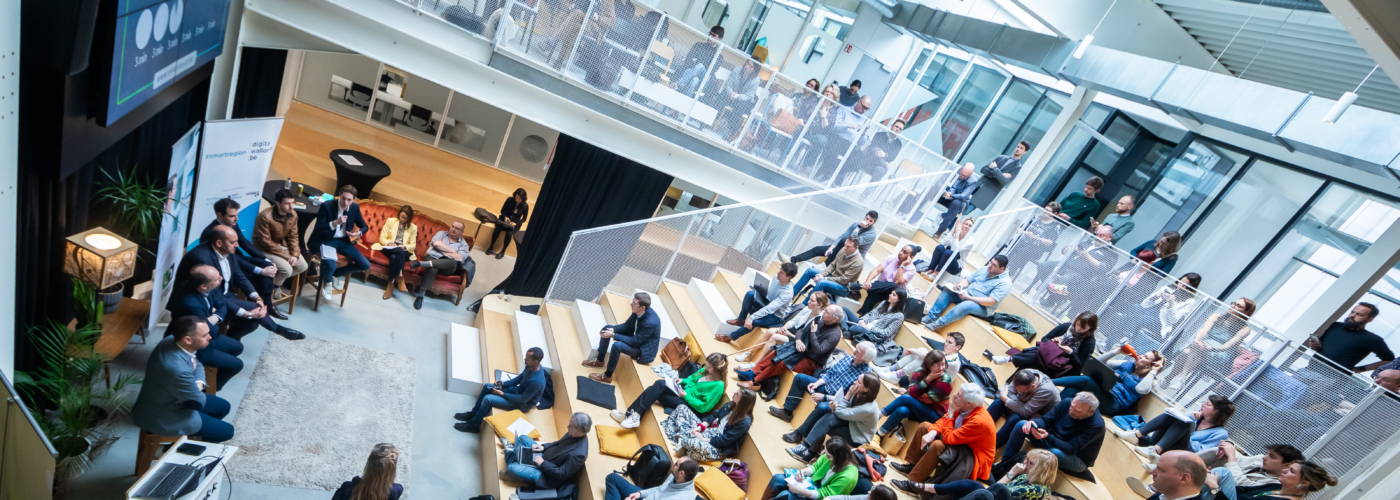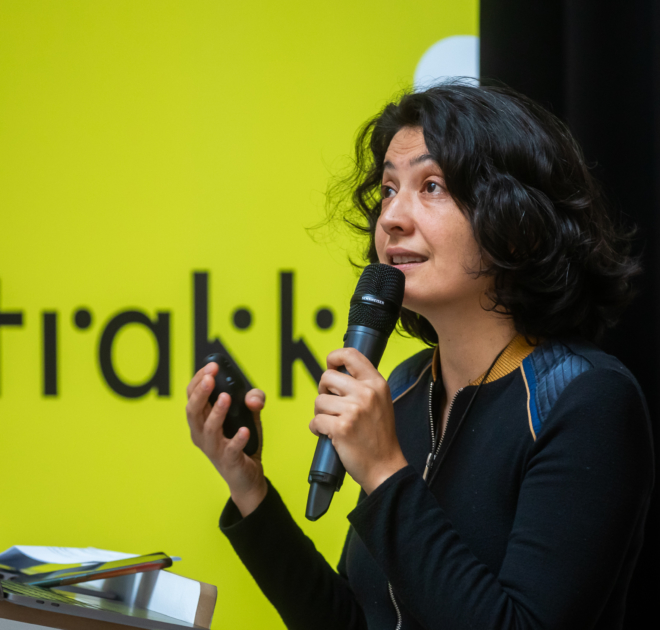The digital is also political

Article author :
Last March 21, the Namur territory played host to the 5th edition of the ‘Live the City’ conference, whose guiding thread this year was the question: ‘The digital, political?’ Academics and representatives from each Walloon democratic party explored the issues behind the digital technology rollout, through the prism of local initiatives. With elections coming up in June, there was a fair bit at stake in these discussions.
Within the amphitheatre presided over by TRAKK, the Namur creative hub, are gathered just short of seventy citizens, entrepreneurs, public authority representatives and researchers. On the agenda of this morning conference, they are about to attend: four academic talks, as a means of limbering up: each lecturer or guest speaker has precisely 10 minutes to briefly raise the issues behind four transversal themes.
The digital weighs as much as an aeroplane
It is Amélie Lachapelle who gets the ball rolling by tackling the first theme, and a pretty key one it is too: the environmental impact of the whole of the digital sector. You may have already come across this figure on kingkong: according to the French Green Transition Agency (ADEME), globally, the digital domain accounts for 4% of greenhouse gas emissions. As much as the airline industry. And the evolution indicators for the coming years are not flashing green, point out several contributors to a recent RTBF article, even though the digital sector can help us to monitor these emissions. And that is precisely why the digital must not be taken off the table as regards party policy platforms at the forthcoming elections.

In her talk, the Doctor of Law, UNamur assistant lecturer and researcher at the Namur Digital Institute (NADI) performs a backward zoom out over the European institutional landscape to when this problem first started being addressed seriously. The issue is as much environmental as geopolitical and social. Let us for example consider the extraction of the rare metals required for the manufacturing of our technological objects. ‘On this point, a European directive of 2009 demands that products tied to energy, such as computers or servers, meet ecodesign standards,’ states Amélie Lachapelle. ‘But this directive is restricted to the hardware layer of products.’ Even if, last December, the European legislators came to an agreement on a proposal to widen the ecodesign field of application to all products, it is kiss goodbye time to an ecodesign of services such as software. The focus is set on the environment, much less so on the social impact of digital technology, which is nevertheless also sizeable.
This is what explains the often criticised, and rightly so, disconnect between, on the one hand, environmental policies and, on the other, digital policies.
Amélie Lachapelle, Doctor of Law, assistant lecturer at the UNamur
As a legal expert, Amélie Lachapelle does not miss the opportunity to impress on the audience that ‘for decades, we wanted to believe that technological development was necessarily sustainable development, but that is pure technological fantasy. It must not be forgotten that the Treaty on the Functioning of the European Union (EU) makes reference to the fact that the Union’s policy in the domain of the environment is founded on the principles of precaution, prevention, the rectifying of damage to the environment, and the polluter pays. These are fine principles, but not legally binding regulations. A priori, these principles are thus not applied to domains other than the environment. This is what explains the often criticised, and rightly so, disconnect between, on the one hand, environmental policies and, on the other, digital policies.’ Well-founded criticisms in light of another principle, that of integration, with origins in the same Treaty, which, in short, states that the requirements in terms of the preservation of the environment must be included in the definition and the implementation of the EU’s political actions, in particular with a view to promoting sustainable development.
From the divide to collaboration, there is not but a single step
Next up on the microphone is Vincent Englebert, assistant lecturer at the UNamur, who in 55 punchy slides introduces inclusivity in view of the current digital divide. Access to an internet connection, the cost of equipment, a lack of skills or interest, etc. The causes of this divide are multiple, but several core demographics emerge from statistics concerning the most affected: unsurprisingly, the eldest (above 74 years), the least academically qualified and, surprisingly, also the young, of whom one out of two feels restricted by the cost of technologies. ‘Wallonia especially is at the bottom of the class,’ rails Vincent Englebert, facing the politicians seated amongst the gathering. ‘49% of Walloons between 16 and 74 are in digital vulnerability.’

Léa Rogliano then takes the floor wearing her two hats as a researcher in digital ethics and as a coordinator of the citizens’ panel at FARI, a Brussels-based independent research institute exploring the governance of artificial intelligence (AI) technologies to promote a sustainable AI and work towards the common good. The subject of her talk? Citizen participation in the digital context. A crucial issue, given the most recent figures published by the Research Center which demonstrate that more and more (American) citizens are declaring that they do not understand what business companies are doing with their personal data. Some 67% of the people interviewed in 2023, against 59% in 2019.
As a means of enlisting people from every sector of society to the cause, the young institute, which has just barely celebrated its third birthday, encourages its research laboratories to work closely in tandem with Brussels public institutions and citizens. Amongst the range of initiatives it has already established, FARI can include its datawalks. Urban 2.0 walks taken as a group in the capital’s hypercentre. ‘A number of data sensors are positioned almost everywhere in public spaces,’ explains Léa Rogliano. ‘ANPR cameras (Editor’s note: smart cameras for automatic number plate recognition), connected dustbins, recharging points for electric cars, etc. During these walks, we try to understand with the walkers why our data is collected, by who and to what ends, in order to ask ourselves to what extent the development of smart cities can give rise to more efficient and more sustainable urban environments.’
Finally, Audrey Lebas, a researcher at the ULiège Smart City Institute, draws to a close this dense academic contribution by looking into public-private collaboration in the digital development of cities. The theme may have been a little too abstract for some in the audience. What emerges from her talk is that, from a governance perspective, for a smart territory to be effective, it must be thought through across the collaboration of four stakeholders: the public authorities, the private sector, the world of research and civil society. It is not the primary function of the public sector to develop innovation. ‘The more we bring about the participation of the private sector, the more significant will be the degree of innovation, and the more the transfer of risk will shift from the public to the private,’ argues Audrey Lebas.

The second part of the conference is marked by a somewhat unruly political debate to discuss the issues tied to digital policy in our territories, bringing together on their high chairs the representatives of Walloon political parties: Maxime Prévot (Federal Member of Parliament and Mayor of Namur, Les Engagés), Mathieu Michel (Secretary of State for Digitalisation, MR), Jules Eerdekens (co-opted Senator, PS), Octave Daube (Vice-President of Comac, the PTB’s student movement), Rodrigue Demeuse (Senator, Walloon Member of Parliament and of the French-speaking Community, Ecolo) and Julien Lemoine (municipal councillor, DéFI).
Four questions which re-examine the issues looked at earlier, three minutes per person to respond, a minute or two granted by the moderator to reply to a counterpart. A testosterone-fuelled political meeting, for that matter, symptomatic of the lack of female representation and the gender bias in the digital sector. Questioned in particular on concrete measures, the political parties across the board wish to retain a physical alternative, such as counters with people at them and a direct hotline in public administration. The topics of educating about the digital and the development of free software gave rise to several comments on the inclusivity of the digital, as did that of planned obsolescence and research into the subject of low-tech to move towards a more sustainable digital landscape.
Whilst a number of politicians are not ardent enthusiasts of degrowth, and even less of its application in the digital domain, one of the avenues briefly raised during this large round table nevertheless merits an attentive pause for thought: digital sobriety. According to The Shift Project, a French think-tank, it consists of moving from an automatic, instinctive, even compulsive, digital world to one which is more considered and piloted. The digital transition will only have the impact of a revolution if it includes the issues of sustainable development. The digital desperately needs limits and must be developed to meet needs, which proves to be a societal choice, and, therefore, a political choice.
A story, projects or an idea to share?
Suggest your content on kingkong.





